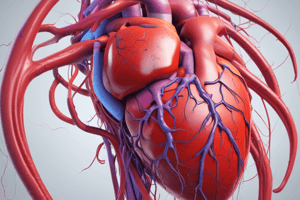Podcast
Questions and Answers
Which of the following is a histopathologic change that occurs in the adrenal gland during shock?
Which of the following is a histopathologic change that occurs in the adrenal gland during shock?
- Coagulative necrosis
- Fatty change
- Hemorrhage and mucosal necrosis
- Cortical lipid depletion (correct)
What is the initial peripheral vascular response in septic shock?
What is the initial peripheral vascular response in septic shock?
- Vasodilation (correct)
- Hemorrhage
- Mucosal necrosis
- Vasoconstriction
Which organ shows evidence of damage throughout other tissues during shock?
Which organ shows evidence of damage throughout other tissues during shock?
- Heart
- Liver
- Brain (correct)
- Kidney
What type of necrosis occurs in the heart during shock?
What type of necrosis occurs in the heart during shock?
What is the main cause of cell damage in many tissues during shock?
What is the main cause of cell damage in many tissues during shock?
What is the main consequence of irreversible stage of shock?
What is the main consequence of irreversible stage of shock?
Which of the following is NOT one of the major categories of shock mentioned in the text?
Which of the following is NOT one of the major categories of shock mentioned in the text?
What is the mortality rate associated with Cardiogenic Shock?
What is the mortality rate associated with Cardiogenic Shock?
Which of the following is NOT a cause of Cardiogenic Shock mentioned in the text?
Which of the following is NOT a cause of Cardiogenic Shock mentioned in the text?
What is the mortality rate associated with Septic Shock?
What is the mortality rate associated with Septic Shock?
What is the most common form of septic shock?
What is the most common form of septic shock?
Which stage of shock is characterized by widespread hypoxia and imbalances due to anaerobic glycolysis and production of lactic acid?
Which stage of shock is characterized by widespread hypoxia and imbalances due to anaerobic glycolysis and production of lactic acid?
Which condition is responsible for the sudden onset of symptoms such as rapid breathing, difficulty breathing, rapid heart rate, irritability, delirium, and coma?
Which condition is responsible for the sudden onset of symptoms such as rapid breathing, difficulty breathing, rapid heart rate, irritability, delirium, and coma?
What is the mortality rate for patients who develop Fat Embolism Syndrome (FES)?
What is the mortality rate for patients who develop Fat Embolism Syndrome (FES)?
Which condition is caused by the introduction of >100 ml of air into the vasculature?
Which condition is caused by the introduction of >100 ml of air into the vasculature?
What is the mortality rate for Amniotic Fluid Embolism?
What is the mortality rate for Amniotic Fluid Embolism?
What is the main cause of infarcts?
What is the main cause of infarcts?
Which type of infarct occurs in loose tissues with sluggish venous outflow or venous occlusion?
Which type of infarct occurs in loose tissues with sluggish venous outflow or venous occlusion?
Which of the following is the definition of embolism?
Which of the following is the definition of embolism?
Which of the following is the main origin of emboli?
Which of the following is the main origin of emboli?
Which of the following is NOT a type of embolism mentioned in the text?
Which of the following is NOT a type of embolism mentioned in the text?
What is the definition of infarct?
What is the definition of infarct?
What are the two morphologic types of infarct mentioned in the text?
What are the two morphologic types of infarct mentioned in the text?
What is the definition of shock?
What is the definition of shock?
Which vessels are most commonly affected by emboli arising from venous thrombi?
Which vessels are most commonly affected by emboli arising from venous thrombi?
What is the estimated occurrence rate of pulmonary embolism in hospitalized patients?
What is the estimated occurrence rate of pulmonary embolism in hospitalized patients?
What is the main outcome of emboli lodging within a vessel with a smaller diameter than the embolus itself?
What is the main outcome of emboli lodging within a vessel with a smaller diameter than the embolus itself?
What is the consequence of infarct in tissues downstream of occluded vessels?
What is the consequence of infarct in tissues downstream of occluded vessels?
What is the most common origin of systemic thromboemboli?
What is the most common origin of systemic thromboemboli?
What is the condition called when venous thrombi give rise to emboli that travel to the right ventricle and then move into the left ventricle via a defect in the inter-ventricular wall?
What is the condition called when venous thrombi give rise to emboli that travel to the right ventricle and then move into the left ventricle via a defect in the inter-ventricular wall?
Flashcards are hidden until you start studying




